'I thought strokes only happened to elderly people'
Strokes are often associated with older people but, according to figures, one in four of them occur in younger people. The BBC spoke to three young survivors who wanted to share their stories to help raise awareness.

'It can happen to any of us at any stage of life'
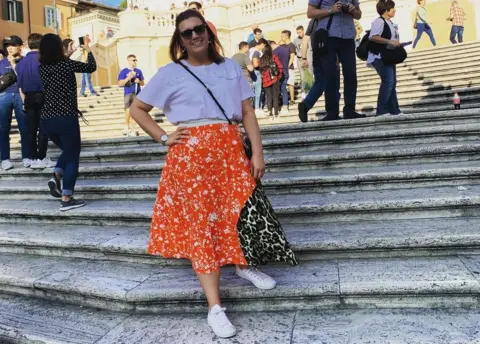 Kayleigh Trainor
Kayleigh TrainorKayleigh Trainor was 27 when she had a stroke "completely out of the blue".
"I woke up and was getting ready for work when I looked in the mirror and noticed there was a drop in my face.
"I thought nothing of it and drove myself to work, and it wasn't until I got there that other people were asking me if I was OK.
"I went to the chemist thinking I'd had an allergic reaction but the pharmacist was really concerned and told me to go to A&E," she says.
The teacher, who lives in Harlow, went to hospital "believing it was an overreaction" and "apologised for wasting everyone's time".
But she was shocked to discover she was not wasting anyone's time at all.
"I was rushed through, with doctors monitoring me and tests carried out. I was told I had had a stroke," says Miss Trainor, now 32.
"I was a little bit in disbelief because to me I felt OK. I associated strokes with elderly people, I thought I couldn't have had a stroke."
She adds: "You think you're exempt to these things but it can happen to anyone of us at any stage of life."
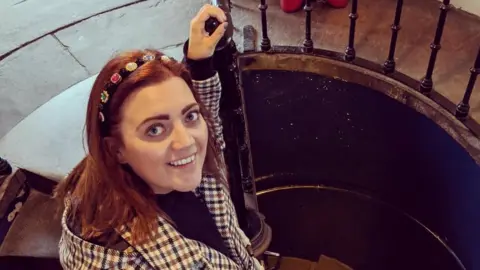 Kayleigh Trainor
Kayleigh TrainorMiss Trainor, who is originally from County Armagh, went back home for 10 days while she recovered from the brain injury in November 2015.
The assistant headteacher at Forest Hall School in Stansted says she has had no symptoms since and medics never established what led to her stroke.
Her grandfather previously had a stroke and doctors told her it could have been caused by stress but there was nothing they "could pinpoint to say that was the cause of it".
Miss Trainor, who recently raised £1,400 for the Stroke Association by walking 1.2 million steps over 120 days, says there needs to be more awareness of the risk to young people.
"I tell my pupils at school I had a stroke and they say 'no you didn't, old people have them' and I tell them anyone can have a stroke," she says.

'Three different doctors thought I had a migraine'
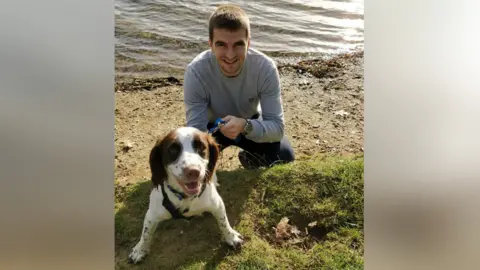 Daniel Payne
Daniel PayneDaniel Payne had been "fit and healthy" all of his life and had represented his university at athletics.
But at the age of 23, when he was working as a buyer for a London firm, he starting to experience a sudden loss of vision in one eye.
He says he felt "really strange" and had a pulsing sensation in his right arm - but did not experience any of the classic symptoms of a stroke, such as slurred speech or facial droop.
Mr Payne knew something was wrong so went to the doctors, but on each of his three visits to his GP surgery - to three different practitioners - they thought he had a migraine.
Still not feeling right, and with a loss of control of his right hand, he took himself to hospital where physical tests showed no signs of a stroke and a CT scan came back clear.
It was only after he had an MRI that medics realised the truth.
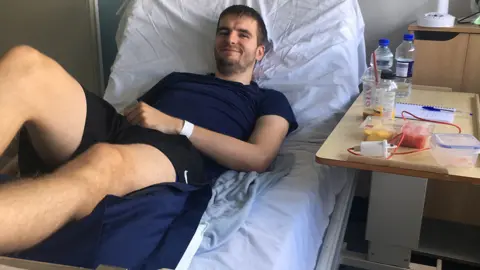 Daniel Payne
Daniel Payne"They were like 'why on earth have you had a stroke when you're fit and healthy and at your age', so the investigations began," he says.
Doctors discovered he had a large hole in his heart, which they believed caused his stroke.
He had to undergo surgery to have the hole closed, and spent more than a week in hospital.
Mr Payne, who lives in Warfield, Berkshire, says he experienced panic attacks and anxiety after his stroke and self-funded cognitive behavioural therapy.
He still wears specialist glasses to help his vision. His girlfriend Laura McDonnell, a physiotherapist, helped him get control back in his right hand.
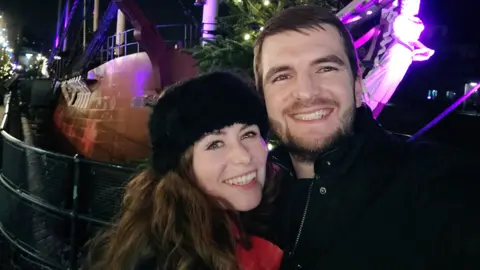 Daniel Payne
Daniel PayneNow 26, he says he is finally in a "good place". He started volunteering with Milton Keynes-based charity Different Strokes in 2019 to help support other young people who have had a stroke.
"When people think of strokes, they think of older people and all of the support out there when I had mine was for people aged over 60," he says.
"It's very different for a young person to have a stroke, they have their whole lives in front of them and it can completely change their life plans.
"It's awful for an older person to have one but it's a very different set of circumstances for a younger person."

'After my stroke I was the 'sick kid' at school'
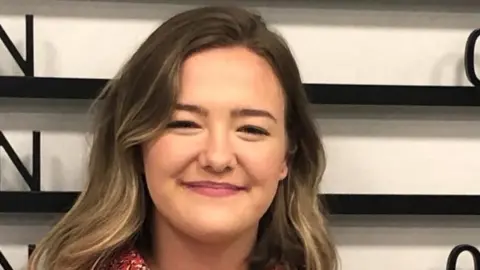 Elizabeth Kiss
Elizabeth KissElizabeth Kiss was just 13 when she had a stroke.
It was the day of her cousin's wedding and the family was getting ready to celebrate the special day when it happened.
"It was quite eventful for everyone," she says.
Now aged 20, she remembers her mum suspected a stroke "straightaway because I was slurring and my face had dropped all on the left side".
"She told the doctors it was a stroke but they didn't listen because of my age, they thought it was just a teenage migraine at first," she says.
But tests showed it was a stroke and she underwent lifesaving surgery.
Miss Kiss had open heart surgery when she was eight and had suffered from migraines, which is thought to have led to her stroke.
She was paralysed down her left side and although she now has movement in her shoulder and elbow, her use of her left hand and fingers is still limited. Seven years on, she also still has weakness in her left leg.
The shop assistant from Ingatestone, Essex, has suffered from depression and anxiety, which she believes is linked to the stroke.

Signs and symptoms of a stroke
One in four strokes happen to people under the age of 65, according to the charity Different Strokes. It says people should use the FAST acronym as a simple test.
- Face - has their face fallen on one side? Can they smile?
- Arms - can they raise both arms and keep them there?
- Speech - is their speech slurred?
- Time to call 999 if you see any one of these signs
Other stroke symptoms include sudden loss of vision, sudden weakness or numbness on one side of the body, sudden memory loss or confusion, sudden dizziness or unsteadiness, or a sudden fall.
Source: Different Strokes

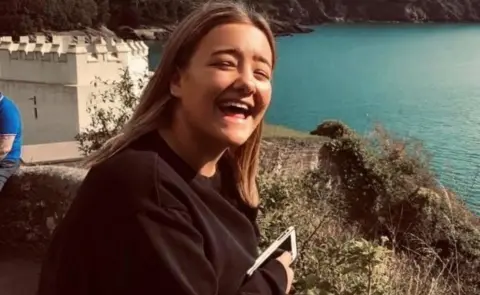 Elizabeth Kiss
Elizabeth KissMiss Kiss says having a stroke as a teenager was a "learning curve" for her teachers as well as her family as they "did not know how to treat me".
She also missed out on quite a lot with her friends.
"I struggled a lot with friendship groups, I didn't get to do all the things a teenager normally would and no-one knew how to treat me.
"People were either really sympathetic or awkward. I lost friends because I needed a lot of help sometimes," she says.
The stroke also prevented her from taking part in her usual sports and activities.
"Before my stroke, I was known as the 'popular one' but after it I was the 'sick kid'.
"I was bubbly before but I got depression and people were awkward around me.
"Now I'm getting back to being the bubbly person I was before."
Miss Kiss, who still has annual hospital visits, says she wants to raise awareness that strokes can happen to young people.
"It's horrible that people don't realise," she says.
"The fact that the doctors didn't realise I was having a stroke makes me want to raise awareness even more.
"I don't want other people to go through what I've been through."

Find BBC News: East of England on Facebook, Instagram and Twitter. If you have a story suggestion email [email protected]
